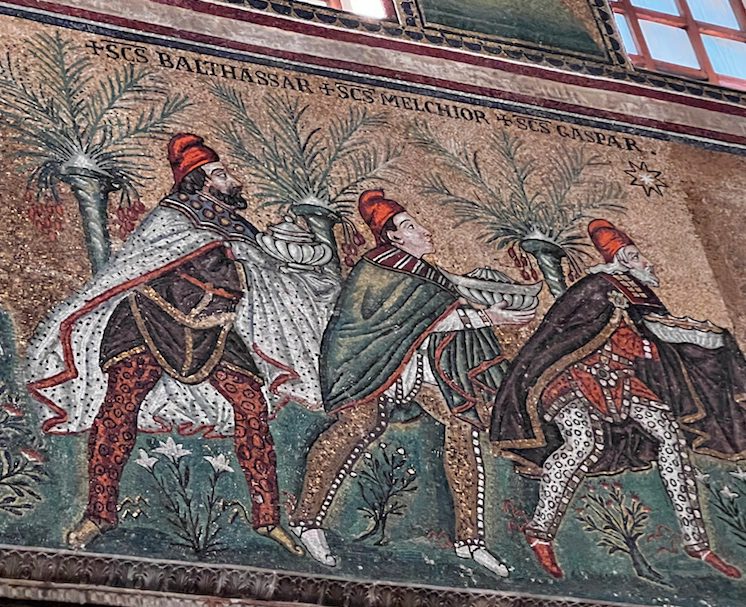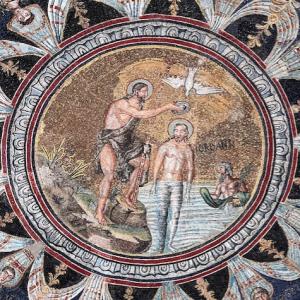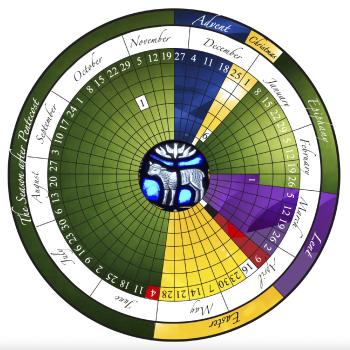
Epiphany has arrived—finally, the Magi can meet the child Jesus! Our composite Nativity scenes most often include both shepherds and wise men observing the holy family, but the biblical story teaches us that the visiting groups arrived at vastly different times. It’s become a family tradition in many homes to move the three kings and all their entourage closer to the creche each day after Christmas, until finally they reach the scene on January 6.
Why January 6?
Centuries of church history and tradition have developed a calendar that begins with Advent, four Sundays before December 25, then breaks out in celebration of the newborn king with twelve days of Christmas, which end on Twelfth Night, January 5th. The following day brings the first major feast day of the new calendar year, Epiphany. This date has been established since the third century, making Epiphany one of the principal feast days of the early church, along with Easter and Pentecost (Christmas came much later).
The season of Epiphany lasts until Ash Wednesday, which marks the beginning of the next church season, Lent. Because Lent is linked to Easter, which is a variable date based on a lunar calendar, the season of Epiphany also varies in length. In 2024, it lasts about six weeks.
What does Epiphany mean?
Epiphany means manifestation or revelation. Since the church calendar focuses on the life of Christ and the church, the first six months revolve around events in Jesus’s life: the anticipation of his coming (Advent), his birth (Christmas), and now his revelation to the people. Scripture readings in lectionaries across the globe will feature passages that talk about Jesus’s glory—the “radiant revelation of himself, an emanation of his attributes that humans can receive only by faith. . . the combination [of] radiance and power . . . denotes God’s sheer majesty and dominion [and] should always be a companion to attributes like ‘merciful’ and ‘loving'” (Fleming Rutledge in her new book, Epiphany).
In other words, now that Christ has come, we look to how he revealed his divine glory, how he made manifest his power to the witnesses during his lifetime on earth. Rutledge points out that Epiphany uniquely focuses on Jesus, giving this season a Christological emphasis.
Themes of Epiphany
The visit of the Magi: Matthew 2 tells the story of the star of Bethlehem, which wise men, or magi, “from the East” (2:1) followed to find and worship “the child who has been born king of the Jews.” The presence of the star marks a theme of light or radiance, which we’ll see in other passages as well. And the magi revealed the presence of the promised king—a theme which we’ll see repeated in coming passages.

Jesus’s Baptism: In Mark 1:4–11, we read of Jesus’s self-revelation through his baptism. Until this moment, he had lived in relative obscurity, waiting for his time to begin. John knew him and wondered aloud at his request to be baptized, recognizing his own unworthiness to perform that act. But Jesus insisted, and upon emerging from the water he experienced the approval of God—the other two Persons of the Trinity—in the form of a dove (Spirit) and the Father’s voice from heaven. Truly, the Son of God was revealing himself to the world.
Wedding at Cana: In John 2:1–12, Jesus attends a wedding with his followers and his family. His mother, Mary, noticed that the wine had run out, a serious social faux pas for the hosts. In an effort to minimize their stress and dishonor, she asked Jesus to intervene. And though he did so quietly, behind the scenes, his first miracle of turning water into wine kicked off his public ministry with a bang. His act of mercy revealed his divine power. He was ready to go public.
The Transfiguration of Christ: The last Sunday before Lent is also known as Transfiguration Sunday, the final celebration of the Epiphany season. On this day, we read of Jesus’s mountaintop moment in Luke 9:28–36 in which he was physically transfigured (also Mark 9:2–9 and Matthew 17:1–8). Again, light and radiance dominate the scene. Jesus revealed his divine glory—he let his “glorious splendor” shine through. He was not only a good teacher and righteous person; he was the God of Israel. Meeting with Moses and Elijah, who represented the Law and the prophets, Jesus was the fulfillment of both.
So What?
Epiphany can become an opportunity to sit beneath the brilliance and radiance of the God who loves us so much that he became a person like us. Immerse yourself in the Gospel texts that teach us of Jesus’s glory, of his majesty and wonder. And remember that he has invited us to join him in new life, one that reflects his righteousness, goodness, and love. Consider adding to your prayer life and worship a song or recitation of the doxology (doxa = glory, ology = word —doxology is a word of glory).
Praise God from whom all blessings flow;
Praise Him all creatures here below;
Praise Him above, ye heav’nly hosts;
Praise Father, Son, and Holy Ghost.
A prayer to memorize:
To him who is able to keep you from stumbling
and to present you before his glorious presence without fault and with great joy—
to the only God our Savior be glory, majesty, power and authority,
through Jesus Christ our Lord, before all ages,
now and forevermore!
Amen. (Jude 24–25).
*I photographed the header image in January 2023 during a visit to Ravenna, Italy. The mosaic of the three kings was created in the early seventh century.












